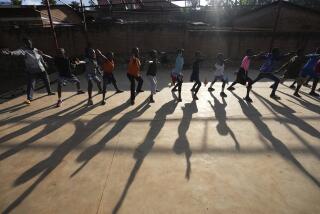Witness Likens Rwanda to Nazi Atrocities
- Share via
GAHINI, Rwanda — “This can only be compared to what the Nazis did,” says Marcel Gerin, a Belgian rancher in Rwanda who for three weeks fled Hutu militias and witnessed their massacres.
The attacks are the work of the Interahamwe (Those who attack together) militias: people sliced to pieces with machetes and axes, skulls crushed with rocks, children tied in sacks and tossed into rivers.
“In the banana fields there are more dead bodies than bananas,” says Gerin, 48, who with his Mexican wife, Gloria, has sought refuge with advancing rebels of the Rwandan Patriotic Front in Gahini, 40 miles east of Kigali.
Rotting victims of the mass killings litter the roads into Gahini village, lie in the fields or spill from hut doorways, contorted by the panic that gripped their last living moments.
Death’s stench is inescapable.
The Gerins’ nightmare began in the hours after Rwandan President Juvenal Habyarimana, with his Burundian fellow leader, was killed in an April 6 rocket attack on his plane.
RTLM radio--the mouthpiece of the hard-line Hutu Coalition for the Defense of the Republic party, referred to as CDR, which calls for the extermination of Tutsis--accused Belgian U.N. troops of downing the plane at Kigali airport, a report strongly denied by the Brussels government.
Gerin says supporters of CDR and Habyarimana’s own party came to threaten him at his ranch near Rusomo, 100 miles southeast of Kigali, where he farmed game animals such as zebra and impala for meat.
Rusomo became the main crossing point for up to 250,000 refugees into neighboring Tanzania last week until the rebels occupied it.
Living on hilltops and eating grass or hiding in banana groves, the Gerins moved warily through the killing fields, observing the work of the militias until they reached the rebels and Gahini.
They are being evacuated through rebel-held territory to Uganda and then Europe, but Gerin vows to bring attention to what he terms the genocidal killings and plight of Rwanda’s civilian survivors.
More to Read
Sign up for Essential California
The most important California stories and recommendations in your inbox every morning.
You may occasionally receive promotional content from the Los Angeles Times.













